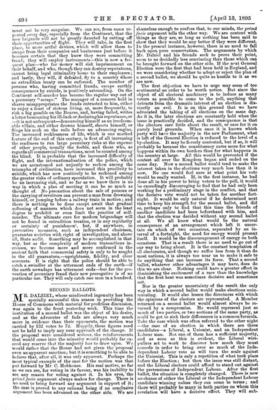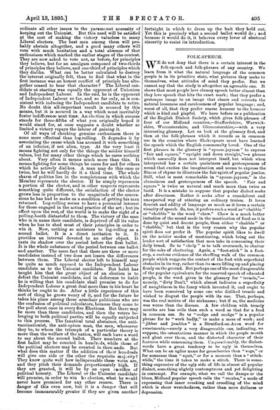SECOND BALLOTS.
MR. DALZIEL, whose misdirected ingenuity has been specially successful this season in providing the House of Commons with material for profitless discussion, was again to the front yesterday week. This time the institution of a second ballot was the object of his desire, and as the advocates of fads are always very much more in evidence than their opponents, the motion was carried by 132 votes to 72. Happily, these figures need not be held to imply any near approach of the change. If the proposal were considered serious, the reinforcements that would come into the minority would probably far ex- ceed any reserve that the majority has to draw upon. We would rather that the House had not given the proposal even an apparent sanction; but it is something to be able to believe that, after all, it was only apparent. Perhaps the most typical example of the case for the motion was that put forward by Mr. C. Hobhouse. His real motive, so far as we can see, for voting in its favour, was his inability to see any reason for voting against it. In his eyes, the primci facie argument always makes for change. There is no need to bring forward any argument in support of it; the ease is proved to any rational being if no conclusive argument has been advanced on the other side. We are shameless enough to confess that, to our minds, the primd facie argument tells the other way. We are content with things as they are, so long as nothing has been said to show that they would be any better if they were different. In the present instance, however, there is no need to fall back upon pure conservatism. The arguments by which Mr. Dalziel and his friends seek to prove their point, seem to us decidedly less convincing than those which can be brought forward on the other side. If the next General Election were the first that had been held in England, and we were considering whether to adopt or reject the plan of a second ballot, we should be quite as hostile to it as we are now.
The first objection we have to urge may seem of too sentimental an order to be worth notice. But since the object of all electoral machinery is to induce as many voters as possible to come to the poll, anything that detracts from the dramatic interest of an election is dis- tinctly an evil. It is on this ground that we have advocated the taking of all elections on the same day. As it is, the later elections are constantly held when the issue is practically decided, and the consequence is that the electors care little about the result, or care for it on purely local grounds. When once it is known which party will have the majority in the new Parliament, what is left of the General Election is reduced to the level of a by-election. It may be fiercely contested, but if so, it will probably be because the constituency cares more for what happens within its own borders than for what happens in the country at large. All this would be prevented if the contest all over the Kingdom began and ended on the same day. Now a second ballot would tend to make the interest taken in the elections very much less than it is now. No one would feel sure at what point his vote would be really wanted. If, in the first instance, he had done all in his power to bring voters to the poll, it would be exceedingly discouraging to find that he had only been working for a preliminary stage in the conflict, and that the decisive vote would not be taken for another fort- night. It would be only natural if he determined next time to keep his strength for the second ballot, and did so, perhaps only to find that this time the friends of another candidate had been beforehand with him, and that the election was decided without any second ballot at all. We all know what would be the natural consequence of an arrangement which left it uncer- tain on which of two occasions, separated by an in- terval of a fortnight, the need for energy would present itself. It would be the discouragement of energy on both occasions. That is a result there is no need to go out of our way to bring about. It is the constant temptation of all electorates, and though we suffer less from it than do most nations, it is always too near us to make it safe to do anything that can increase its force. That a second ballot, whatever other advantages it may have, does do this we are clear. Nothing could have a greater effect in diminishing the excitement of a race than the knowledge that the first heat was sometimes decisive and sometimes not.
Nor is the greater uncertainty of the result the only way in which a second ballot would make elections unin- teresting. It would also lessen the directness with which the opinions of the electors are represented. A Member returned on a second ballot would almost always be re- turned by a compromise. He would represent just so much of two parties, or two sections of the same party, as could be got to sink their differences in a common formula. Take the case which was often referred to the other night —the case of an election in which there are three candidates—a Liberal, a Unionist, and an Independent L tbour man. Not one of them has a sufficient majority, and as soon as this is evident, the Liberal wire- pullers set to work to discover how much they must concede in order to bring over so much of the Inde- dependent Labour vote as will turn the scale against the Unionist. This is only a repetition of what took place before the Election ; but then the issue was still distant, and the Liberal electors could afford to stand out against the pretensions of Independent Labour. After the first ballot, the situation is completely changed. There is now no chance of either the Liberal or the Independent Labour candidate winning unless they can come to terms ; and there will probably be many in both parties on whom this revelation will have a decisive effect. They will sub- ordinate all other issues to the paramount necessity of keeping out the Unionist. But this need will be satisfied at the cost of mating the victory valueless to many Liberal electors. The best men among them will pro- bably abstain altogether, and a good many others will vote with much hesitation and a total absence of that enthusiasm which marked the earlier stages of the contest. They are now asked to vote not, as before, for principles they believe, but for an amalgam composed of two-thirds of principles they believe, and one-third of principles which they dislike. What can be better calculated to destroy the interest originally felt, than to find that what in the first instance was an honest conflict of principle has alto- gether ceased to bear that character ? The Liberal can- didate at starting was equally the opponent of Unionism and Independent Labour. In the end, he is the opponent of Independent Labour so far, and so far only, as is con- sistent with inducing the Independent candidate to retire. No doubt this all-important result is secured by this means, but it is secured in a way which must inevitably foster indifference next time. An election in which success stands for three-fifths of what you originally hoped it would stand for, at once suggests a doubt whether so limited a victory repays the labour of gaining it. Of all ways of checking genuine enthusiasm there is none more effectual than log-rolling. It degrades it by associating the cause which has aroused it with something of an inferior, if not alien, type. At the very least it means fighting not only for the things the soldier himself values, but for many other things which he cares nothing about. Very often it means much more than this. It means fighting for some things he cares for and for others which he actively dislikes. A man may do this once or twice, but he will hardly do it a third time. The whole charm of politics lies in the completeness with which the Member represents the elector. If he simply represents a portion of the elector, and in other respects represents something quite different, the satisfaction of the elector grows less in proportion to the magnitude of the conces- sions he has had to make as a condition of getting his man returned. Log-rolling seems to have a perennial interest for those engaged in the actual practice of the art ; but its effect upon the rest of the world is to make the sight of a polling-booth distasteful to them. The victory of the man who is in name their candidate, is deprived of all its value when he has to shed most of their principles in order to win it. Now, nothing so ministers to log-rolling as a second ballot. It is a direct invitation to it. It provides an interval devoted to no other object. It casts its shadow over the period before the first ballot. It is the whole substance of the period between one ballot and another. The mere fact that there are three or more candidates instead of two does not lessen the differences between them. The Liberal elector left to himself may be quite as much opposed to the Independent Labour candidate as to the Unionist candidate. But habit has taught him that the great object of an election is to defeat the Unionist candidate, and in deference to habit he is willing that his candidate shall promise to do for Independent Labour a great deal more than in his heart he thinks he ought to do. After a little experience of this sort of thing he grows weary of it, and for the future he takes his place among those armchair politicians who are the confusion of political calculators, because they come to the poll about once in every five Elections. But there may be more than three candidates, and then the voters be- longing to both political parties will be equally subjected to this process. The fanatical total abstainer, the anti- vaccinationist, the anti-opium man, the men, whosoever they be, to whom the triumph of a particular theory is more than the welfare of the nation, will each have a word to say about the second ballot. Their numbers at the first ballot may be counted in hundreds, while those of the political electors may be counted in thou: ands. But what does this matter if the addition of their hundreds will give one side or the other the requisite majority? They know quite well how indispensable these votes are, and they pitch their demands proportionately high. If they are granted, it will be by an open sacrifice of political honesty. The Liberal or the Unionist candidate will promise, in order to win h3 election, what he would never have promised for any other reason. There is danger of this even now, but it is a danger that will become immeasurably greater if they are given another fortnight in which to dress up the bait they hold out. Yet this is precisely what a second ballot would do ; and because it would do it, it behoves every lover of electoral sincerity to resist its introduction.



































 Previous page
Previous page